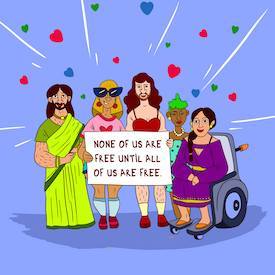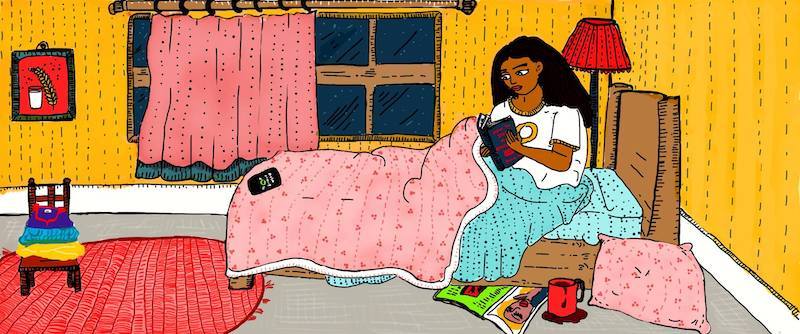Here are five emerging media platforms inspiring Indian and Pakistani feminists

Emerging feminist media platforms are helping South Asian people engage in, navigate, and mobilize feminist movements. Movements like #MeToo and #TimesUp have been building in South Asian countries and have called out sexual harassers at workplaces, homes, and educational institutions; campaigns like #unfairandlovely have raised important issues about colorism; and marches like the Trans Pride March and the Aurat March have made sure that feminist voices from the region can be heard.
Here are five young feminist media platforms created in Pakistan and India that have a growing impact and continuously raise feminist issues in the two countries.

Using hand-drawn comic strips to address important feminist issues, Sanitary Panels is an Indian feminist webcomic that comments on society, culture, and politics. Founded by Rachita Taneja in 2014, the platform’s comics use humor to make important points about otherwise taboo topics, like menstruation, mental health, sexual and reproductive rights, LGBTQ rights, and even Internet rights.
Taneja, who is primarily a human rights campaigner, made the first comic strips when students were being arrested by the BJP (Bharatiya Janata Party) government for sharing their political opinions on Facebook and other social media. Now, five years later, the series reaches “at least a million people every month,” the majority of whom are women, according to Taneja. It has been covered by major national English newspapers, Vagabomb and India Development Review, and has received recognition from The Obama Foundation. Sanitary Panels has also become an emerging voice for movements regarding mental health, workplace harassment, and the right to abortion in India by making comic strips about the issue.
“The reception has been very positive, and a lot of people have told me I help them either feel better about themselves through my LGBTQ or body positivity comics, or that I've encouraged them to start sharing their own opinions online,” Taneja said.
The Spoilt Modern Indian Woman

Another India-based feminist media outlet, The Spoilt Modern Indian Woman (SMIW), runs crowdsourced campaigns that are aimed to break stereotypes, makes short webcomics, and publishes feminist poetry, op-eds, and reviews of Indian and international media. The platform, which started in August 2015, takes on issues including gender violence, gender-based stereotypes, casual sexism, media conditioning, the male gaze, rape culture, toxic masculinity, and homophobia.
“SMIW has had overwhelming attention, support, and love from the audience,” Bruce Vain, one of the two co-founders of the initiative, told the FBomb. “Some of our campaigns have been covered by national and international media and endorsed by societal leaders as well as Bollywood personalities,” he added.
“Our aim going forward is to supplement our current work with creating and crowdsourcing forms of art like music, theater, and spoken word poetry to share intersectional, inclusive, and identifiable messages, while also providing a platform to young feminist artists,” Vain said.

Skin Stories is a digital publication run by the Indian nonprofit organization Point of View that primarily talks about how mental and physical disabilities affect one’s perceived sexuality. Skin Stories exposes its readers to first-hand accounts of Indian women dealing with issues they might otherwise struggle to express publicly; from problems faced by the Dalit women to abortion issues and more.
“Skin Stories has been used in great ways as a resource in classrooms and workshops,” Shreya Ila Anasuya, managing editor of Skin Stories, told the FBomb. “Amnesty International UK Teachers and Schools programme has used it in their schools. We have also been invited to speak at various conferences, festivals, and workshops on sexuality and disability.”
Currently, Skin Stories plans to compile a book of 40 essays and have their work translated into other languages, particularly in Indian dialects, to make them more accessible to more readers. Skin Stories also intends to expand beyond personal essays into audio-visual pieces and long-form journalism to further examine gender and disability.

Trans rights have historically been atrociously marginalized in Pakistan, and the past few years have been particularly bad: Trans folks have faced extreme violence, and trans sex workers have been tortured and killed in great numbers. Trans Action Pakistan wants to change that. Founded in 2015 by a group of transgender and intersex activists from the Khyber Pakhtunkhwa province of Pakistan, Trans Action Pakistan advocates for the rights of LGBTQ+ Pakistanis by creating media that represents them — something that is significantly missing from the mainstream media.
The group has also successfully influenced laws affecting the trans community in recent years, including the issuance of driving licenses to trans people as well as increased representation in politics, with trans politicians taking part in the electoral process. Most recently, Trans Action Pakistan was a prominent advocate of Pakistan’s first ever trans pride parade last year.
“We believe that Trans Action Pakistan has played a fundamental role in advocating trans rights in Pakistan and is a key media influencer,” Qamar Naseem, a prominent member of Trans Action Pakistan, told the FBomb. “We have a following of over 80,000 people on our social media platform who we engage with and provide information to.”

Pakistan-based journalist Sabahat Zakariya launched the YouTube channel Feminustani last year to discuss the issues women in her country face. This show — which is also hosted by Zakariya, who speaks in Urdu, Pakistan’s national language — currently consists of five episodes that aim to unpack feminist perspectives on various issues in a way that is accessible to the masses in Pakistan. Zakariya wants people of the country, particularly women from different social classes, to understand what feminism is, what it stands for, and what it can do for them. For example, one episode addresses the problematic and stereotypical representations of women in Pakistani television dramas.
“The reason Feminustani was created was to allow Pakistani women to have an alternate voice and image to how they are presented here in the mainstream media,” Zakariya told the FBomb. “Progressive, even radical ideas make their way to media platforms like blog sections of English newspapers or Twitter, but rarely do such ideas make their way into Urdu content.”
Amna is one of the four fellows who were selected as part of the Young Feminist Media Fellowship between FRIDA The Young Feminist Fund and The Fbomb. A pilot project launched this year, the fellowship is an attempt to counter dominant narratives that provide little to no space to achievements and accomplishments of young feminist organizers, giving an opportunity to young feminist storytellers to tell the story themselves of young feminist trends around them.
More articles by Category: Disability, Feminism, Media, WMC Loreen Arbus Journalism Program
More articles by Tag: Equality, Sexism, Asia, Women of color


























